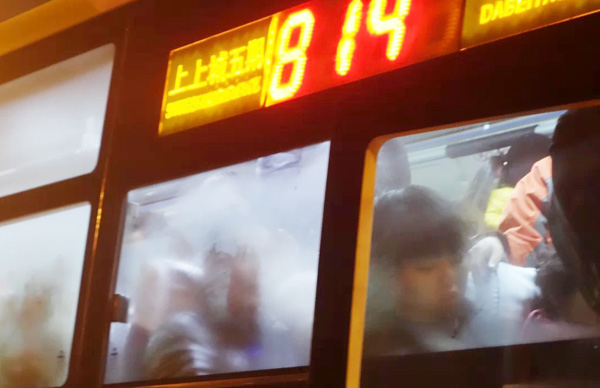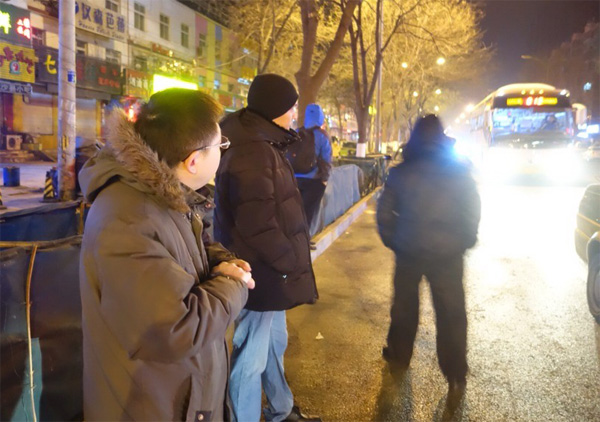A four-hour commute - on a good day
By Song Wei (chinadaily.com.cn) Updated: 2015-01-13 10:38
 |
|
A packed bus leaves Yanjiao for downtown Beijing in the early morning, Jan 12, 2015. [Photo by Song Wei/chinadaily.com.cn] |
"Could you wait for the next one?"
"No, please! I'm running late," a young woman says loudly as she elbows her way to cram herself into a packed 814 bus. The front door somehow manages to close, and the bus finally sets off.
It's 6:30 am in Yanjiao, around 40 km east of Beijing, and vehicles bound for the capital leave every few minutes, each departing with a full load. Those lucky enough to grab a seat doze; the rest strap-hang all the way. For those waiting on minus-degree-Celsius winter mornings the only thing that matters is to get on board.
Like many, Zhao Wei sets off to work early every morning. He gets up at 6:00, arrives at the bus stop by 6:30 after a quick wash but without breakfast.
"Only by setting out this early can I ensure not being late for work," says Zhao, a 32-year-old office worker who undertakes a round trip of about 90 km each day.
The bus station near where Zhao lives is not the start of the route which means he has to force his way into the vehicle. If there is room for both feet he feels lucky. Most times, he is unable to stand in one position all the way to the city.
Zhao should arrive in Beijing in around an hour, where he will switch to the subway for the final leg of his journey to the northern part of the capital. Each day, he spends four hours commuting – if the traffic is light. On bad days it can stretch to five or more.
The fear of gridlock on the road means he rarely slows down, even after finishing work. Hurrying out of the subway station, he takes a few more strides before quickly joining the queue of hundreds of Yanjiao-bound commuters at a bus station in Beijing"s Central Business District.
Queuing for seats usually takes 30 minutes or so. For each passenger who boards a bus, another two join the line.
"I usually take the queue for standing as it takes a shorter time to get on board," says Zhao. "I just want to reach home to be with my family."
 |
|
Zhao Wei (L) waits for 814 bus, Jan 12, 2015. [Photo by Song Wei/chinadaily.com.cn] |
Instead of buying a flat in the capital, Zhao rents an 80-square-meter two-bedroom apartment in Yanjiao. Zhao and his wife are both migrant workers but their joint income does not stretch far.
"My daughter is just 19 months old, so my parents live with us so that they can help take care of her in the daytime," says Zhao. "Our budget is very tight."
The apartment the couple rent costs 1,400 yuan ($225) per month. Compared to similar sized accommodation near where Zhao works, it is cheaper by 4,000 yuan or more.
The low cost of living in Yanjiao has attracted many other workers like Zhao. Some rent while many purchase a property there as the price is almost one third of that in Tongzhou, an eastern Beijing suburb, according to real estate broker Tengyun Property Co.
The town now has 600,000 residents, and officials estimate that 150,000 commute between Yanjiao and Beijing each day; some claim the figure is double that.
"Taking a bus is more economical than car sharing if it is not that cramped," says Zhao.
A round-trip only costs 8 yuan using a Beijing public bus card, compared to a 10-yuan single trip by train or shared car.
"My feet often become numb after one-hour standing on the bus, and I feel terrible pain after a while," adds Zhao.
Although he has been living in Yanjiao for two years, Zhao says he has no plans to purchase a flat either in Yanjiao or Beijing, and he is just trying the best he can to be a good breadwinner.
"Even if I earned two million yuan (the amount required for down payment to buy a two-bedroom apartment near the north third ring road of Beijing), I would not definitely buy an apartment in Beijing," says Zhao. "I would move to smaller cities." He pauses for a while, and adds: "I want to live an easier life, I am just too tired."